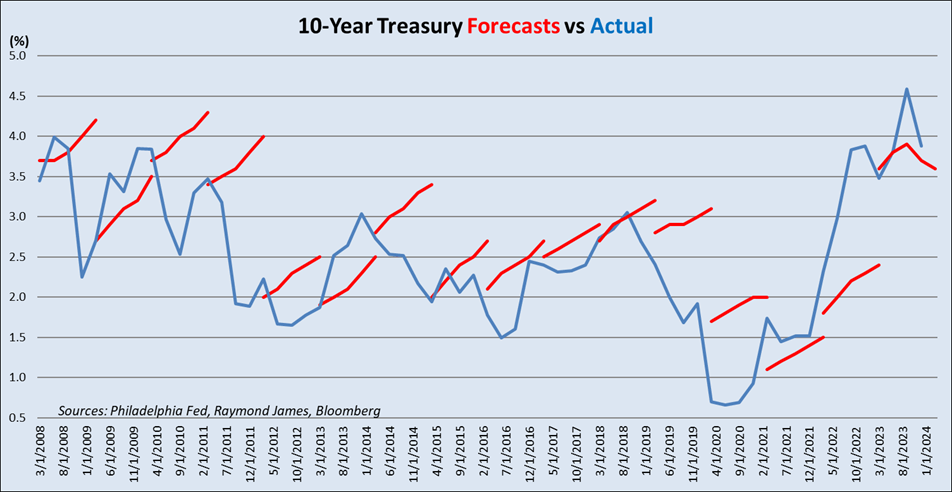Forecasting
Drew O’Neil discusses fixed income market conditions and offers insight for bond investors.
Welcome to 2024! As we wade into the new year, you will undoubtedly read and hear a wide range of forecasts predicting what financial markets are going to bring us over the next 12 months. While taking in a range of predictions and forecasts is informative and can provide valuable market color and data, keep in mind that these are all just guesses about the future. Putting too much weight on strategies that require correctly timing the market could be detrimental should forecasts turn out to be incorrect. Yes, all of the forecasts you come across will (hopefully) be well researched, backed by sound and logical thinking, and will be rational. This does not mean that they are going to come to fruition. Come December 31st, for every money manager out there that was correct with their predictions there will likely be multiples more that were not even close (What percent of active managers actually outperform the market?).
Just how difficult is it to accurately predict the future on a consistent basis? The chart below shines some light on the question by highlighting the prediction for the 10-year Treasury yield at the beginning of each year (red lines) based on the Survey of Professional Forecasters which is conducted by the Philadelphia Federal Reserve. The blue line shows actual 10-year Treasury yields. Notice how often these predictions were correct. Predicting the future is hard. Unforeseen events happen on a regular basis and often determine the direction of the financial markets.
What does this mean for fixed income investors? The beautiful thing about owning individual bonds is that returns are not dependent on what the market does in the future. For buy-and-hold investors, once a bond is purchased, its yield, cash flow, and maturity value are locked in and are unaffected by changes in interest rates*. If you buy a 5-year bond yielding 5% today, it doesn’t matter what interest rates do over the next 5 years. Currently, although yields are off their recent highs of a few months ago, they still remain at some of the most attractive levels in over a decade. In the face of an endless stream of predictions and forecasts, putting money to work in an investment vehicle that requires neither is something to consider as we wade into the unknowns of 2024.
*Barring a default
The author of this material is a Trader in the Fixed Income Department of Raymond James & Associates (RJA), and is not an Analyst. Any opinions expressed may differ from opinions expressed by other departments of RJA, including our Equity Research Department, and are subject to change without notice. The data and information contained herein was obtained from sources considered to be reliable, but RJA does not guarantee its accuracy and/or completeness. Neither the information nor any opinions expressed constitute a solicitation for the purchase or sale of any security referred to herein. This material may include analysis of sectors, securities and/or derivatives that RJA may have positions, long or short, held proprietarily. RJA or its affiliates may execute transactions which may not be consistent with the report’s conclusions. RJA may also have performed investment banking services for the issuers of such securities. Investors should discuss the risks inherent in bonds with their Raymond James Financial Advisor. Risks include, but are not limited to, changes in interest rates, liquidity, credit quality, volatility, and duration. Past performance is no assurance of future results.
Investment products are: not deposits, not FDIC/NCUA insured, not insured by any government agency, not bank guaranteed, subject to risk and may lose value.
To learn more about the risks and rewards of investing in fixed income, access the Financial Industry Regulatory Authority’s website at finra.org/investors/learn-to-invest/types-investments/bonds and the Municipal Securities Rulemaking Board’s (MSRB) Electronic Municipal Market Access System (EMMA) at emma.msrb.org.




